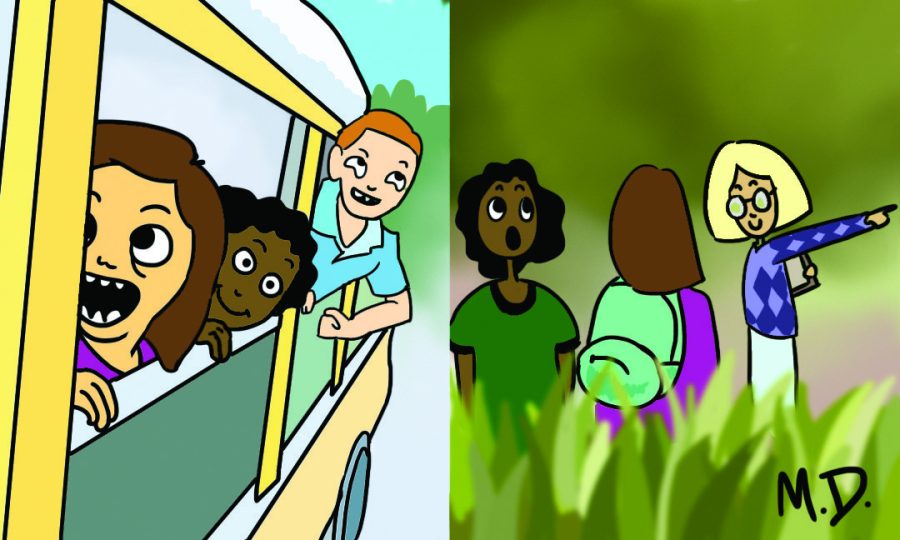Regardless of the quality of your early school experiences, there is one aspect of elementary school education we can all agree on: field trips are awesome. Everyone remembers boarding buses or cars to drive to the Baylands, or trips to museums like the California Academy of Sciences to experience alternative styles of learning.
Extended trips, such as visits to gold-mining towns like Coloma or science camps like Mt. Hermon, are valuable experiences, especially for students who prefer a more hands-on method of learning. In addition to offering course-aligned curricula, many of the camps also promote leadership skills by incorporating team building exercises into their program. For some students, it may be the first time they have been away from home for more than a night. While trips in high school may not be quite as formational, they are still crucial tools for learning.
The Campanile thinks field trips offer valuable educational experiences that cannot be replicated in a traditional classroom setting. Exposing students to the real-life applications of the concepts they are learning fosters an appreciation for core subjects that students might not otherwise have.
Writer’s Craft, an English elective, already offers this opportunity through a partnership with the Children’s Theatre. Students in the class get the chance to submit pieces of their work to the theatre. Actors incorporate the writing into a play which is later performed for the public.
“[Students] can actually work with actors and see what it is like to have their writing performed,” said Lucy Filppu, who teaches Writers Craft. “This offers them a new venue for considering audience and purpose in their writing, and I could not offer that sitting in a classroom.”
However, for most classes in high school, field trips are few and far between. This is mostly due to a plethora of restrictions placed on field trips for core classes like science and history.
Trips must be free for students to allow economically disadvantaged students to participate. They must also have a “connection with courses of instruction or school-related social, educational, cultural, athletic, or school band activities,” according to California Education Code 35330. Transportation can also be an issue. In elementary school, field trips that required driving relied heavily on parent volunteers. However, high school teachers no longer have that option, as parents are generally less involved. Because of this, teachers may have to arrange for alternative transportation methods, such as buses, that eat away at funding.
Funding for field trips is probably the most intricate part of the process. Certain programs, such as choir, theatre and sports, are free to fundraise for local, national and international trips as long as they have Boosters. The ability to fundraise for trips greatly increases the ability for classes to travel, and many of Paly’s music programs take annual trips. Recent destinations include San Jose, New York and Disneyland. However, teachers of core classes are forbidden from fundraising for such trips, forcing them to rely on grants from the school district, which can be hard to come by.
The Campanile thinks more emphasis and funding must be placed on field trips, at both a state and district level because it helps students learn real-world skills and lessons outside of a traditional classroom setting. This easily can be accomplished by simply allocating a greater percentage of the annual district budget for field trips.
As Filppu said, field trips “extend student learning beyond four walls and ugly neon lights. They actualize the kinds of principles and critical thinking that we want to see in our kids.”
As a publication that values immersive learning, we at The Campanile could not agree more.

